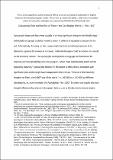Files in this item
Calculating Time and the End of Time in the Carolingian World, c.740-820
Item metadata
| dc.contributor.author | Palmer, James Trevor | |
| dc.date.accessioned | 2015-10-05T14:40:00Z | |
| dc.date.available | 2015-10-05T14:40:00Z | |
| dc.date.issued | 2011-12 | |
| dc.identifier | 9462847 | |
| dc.identifier | eee3ba6c-a8ed-419a-89e2-a8d525ae6043 | |
| dc.identifier | 84856870683 | |
| dc.identifier.citation | Palmer , J T 2011 , ' Calculating Time and the End of Time in the Carolingian World, c.740-820 ' , English Historical Review , vol. 126 , no. 523 , pp. 1307-1331 . https://doi.org/10.1093/ehr/cer325 | en |
| dc.identifier.issn | 0013-8266 | |
| dc.identifier.other | ORCID: /0000-0002-1933-0670/work/27304490 | |
| dc.identifier.uri | https://hdl.handle.net/10023/7600 | |
| dc.description.abstract | The hopes and fears associated with the imminence of apocalypse acted as catalysts for a number of significant changes in history. Relevant patterns of behaviour are not, however, always consistent. This paper examines the intellectual contexts for the (sometimes quite real) fear that the world might end or be revolutionised in c. AD800 with the advent of the ‘6000th year of the world’. It argues that, in the Carolingian world, apocalyptic belief was widespread but that it centred on an undefined sense of imminence and a concern for reform, rather than a prioritisation of specific dates. Indeed, building on recent developments in the study of computus (‘time-reckoning’), it is clear that chronological systems such as AD-dating were adapted and discussed – at length – for their relevance to paschal reckonings, not apocalypticism. Evidence here also points towards the relative independence of centres such as Auxerre, St Gall and Monte Cassino, where questions about time could be pursued without much or any central direction from figures such as Charlemagne. It is therefore dangerous to posit a relative ‘consensus of silence’ about apocalypticism to explain the thin evidence; and doubly dangerous to extrapolate from it that, for example, Charlemagne’s imperial coronation occurred on Christmas Day AD800 for undocumented apocalyptic reasons rather than for the pressing political concerns indicated in the sources. Apocalypticism was real in eighth-century Europe, but it was more varied than often thought. | |
| dc.format.extent | 252777 | |
| dc.language.iso | eng | |
| dc.relation.ispartof | English Historical Review | en |
| dc.rights | © The Author [2011]. Published by Oxford University Press. All rights reserved. This is a pre-copyedited, author-produced PDF of an article accepted for publication in English Historical Review following peer review. The version of record is available online at: https://dx.doi.org/10.1093/ehr/cer325 | en |
| dc.subject | D History (General) | en |
| dc.subject | CB History of civilization | en |
| dc.subject.lcc | D1 | en |
| dc.subject.lcc | CB | en |
| dc.title | Calculating Time and the End of Time in the Carolingian World, c.740-820 | en |
| dc.type | Journal article | en |
| dc.contributor.sponsor | Arts and Humanities Research Council | en |
| dc.contributor.institution | University of St Andrews.School of History | en |
| dc.contributor.institution | University of St Andrews.St Andrews Institute of Medieval Studies | en |
| dc.identifier.doi | 10.1093/ehr/cer325 | |
| dc.description.status | Peer reviewed | en |
| dc.identifier.grantnumber | AH/I025360/1 | en |
This item appears in the following Collection(s)
Items in the St Andrews Research Repository are protected by copyright, with all rights reserved, unless otherwise indicated.

